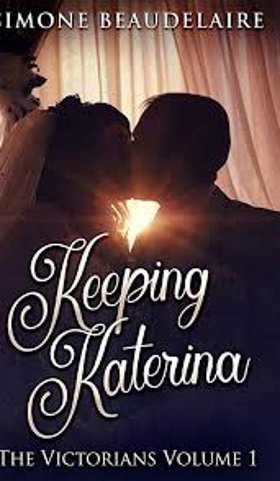his wife's hand to his lips before stepping back, letting the women finish their
work.
Mme Oliver unlaced the wine-colored dress and pulled it from Katerina's
body, leaving her in a chemise and a set of short, waist-length stays that supported her breasts without constricting her breathing. The assistant slipped the white gown over her head and quickly fitted for alterations. Finally finished,
Katerina wriggled into a ready-made dress in a cream flowered print with a full
skirt and heavy pleats in the bodice. The cut created the illusion of a full bosom
above a tiny waist, done so skillfully that the ruse could not readily be detected.
Christopher paid for the dresses and led his wife out to a waiting hansom, which took them to their new home. As he had hoped, the bed had been placed
in the largest bedroom. The young couple retired for an afternoon nap that involved little sleep but proved wonderfully relaxing, nonetheless.

CHAPTER 11
M onday morning, Christopher headed to the cotton mill to meet
with his father, Colonel Turner and some of the other employees.
As he entered the building, he glanced at the tenements through a mist so heavy
it was nearly rain.
What a shame people have to live like this. Disgusting. He hurried inside.
The heat and humidity inside the mill—necessary to keep the cotton strands
supple—provided a welcome respite from the cold of the morning. Christopher
met his father and the colonel at the door.
None of the men spoke. Over the earsplitting noise of the factory, there was
no point. Colonel Turner extended a handful of masks—one of Christopher’s
many inventions to improve the wellbeing of their workers—and Christopher
fitted his over his face.
From the door, he could see the long row of looms. At each one, a worker sat, also masked, working the shuttles as a rainbow of fabric emerged.
Men ran among the looms, gathering the products and transporting them.
The place bustled with activity, each face set in serious lines as they
communicated with one another using hand gestures.
The owners grabbed handfuls of raw cotton and fashioned them into earplugs
before making their way among the weavers for their daily productivity check.
A new worker Christopher hadn't met before caught his eye. She sat at a weaving loom, a shuttle flying fast under her skilled manipulations. Something
strange about her hand warranted a second look, and he felt ill upon noticing the
ring finger on her right hand had been reduced to a raw, red stump. She seemed to sense his presence and looked up.
Seeing he was young and handsome, she winked at him above the mask.
She's a comely little wench, but my wife is more appealing. Then his eyes narrowed. She had a bruise around one eye.
Shaking his head, he followed his father and the foreman to the office, which
was equipped with simple plain desks for father and son. The walls had been outfitted with the best sound-proofing which could be had in 1848; they were stuffed with newspaper. Doesn't help too much, Christopher thought, not for the first time, as his ears adjusted to the clanking and hissing of the factory.
“Well,” Adrian asked as the men removed their masks, “how is everything,
Turner?”
“Excellent,” the bluff former soldier replied, smoothing out his silvered
blond hair where the mask had rumpled it. “As you can see, we have a new girl,

























